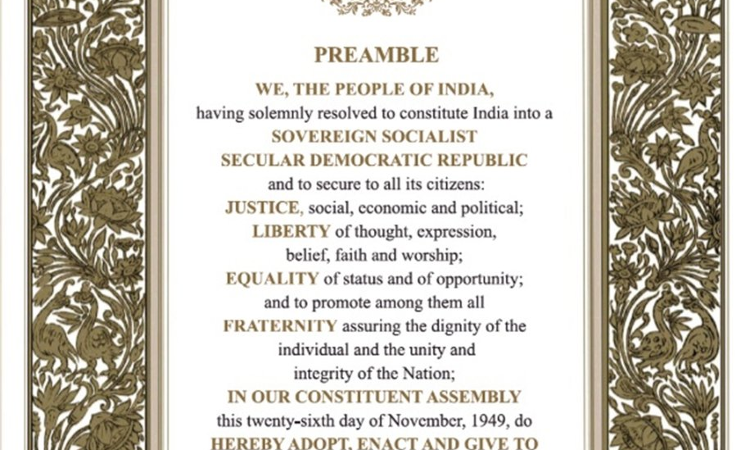Something Disconcerting
V. Sudhish Pai, Senior Advocate
5 July 2025 5:42 PM IST

Certain utterances in the recent past have been strange as well as disconcerting and do not augur well for our polity. The present debate about the expressions 'socialist' and 'secular' in the Preamble is both sterile and puerile. 'Socialist' may appear to give the Constitution an ideological slant. But the socio-economic revolution and ushering in an egalitarian society were always high on the nation's agenda. That is also in keeping with the Directive Principle in Article 39- that the ownership and control of the resources are so distributed as to sub-serve the common good and ensure that there is no concentration of wealth and means of production to the common detriment. This is the Gandhian ideology too, the concept of trusteeship, that what one has is held in trust for all and has to be shared with all. The European understanding and interpretation of the Bible is also that unlike the American understanding which is self-centric. The World We' Re In, a book by Will Hutton beautifully portrays this. It would not be wrong to say that this has always been the Indian outlook to life, indeed a way of life. Socialism, in the context, is not doctrinaire or dogmatic, it is realistic and pragmatic. The amendment only spelt out clearly what was ingrained in our constitutional ethos.
'Secular' in our context is not anti-God or anti-religion. It is equal respect for all religions; and that the State does not support or aid any religion. It is needless to say that India has always been a secular country. Pluralism has been the soul of the Indian nation. As Dr. Ambedkar said, secular State did not mean that we should not take into consideration the religious sentiments of the people; all that it meant was that the State would not impose any particular religion upon the people. Pandit Jawaharlal Nehru said that our secular State was obviously not something opposed to religion but a State which honoured all faiths equally and gave them equal opportunities. Dr. Radhakrishnan remarked, “Secularism as here defined is in accordance with the ancient religious tradition of India. It tries to build up a fellowship of believers not by subordinating individual qualities to the group mind but by bringing them into harmony with each other.”
Accommodation is an attitude which has been described as the: "...most notable characteristic in every field of Indian activity ....is the constant attempt to reconcile conflicting views or actions, to discover a workable compromise, to avoid seeing the human situation in terms of all black or all white.....As India's philosopher President Dr. Radhakrishnan put it: Why look at things in terms of this or that? Why not try to have both this and that?" He also observed that tolerance is the tribute that the finite mind pays to the inexhaustibility of the infinite. Amartya Sen in his Argumentative Indian speaks of the large tradition of heterodoxy in India. He says, heterodoxy "has a bearing not only on the development and survival of democracy in India, it has also richly contributed, I would argue, to the emergence of secularism in India, and even to the form that Indian secularism takes, which is not exactly the same as the way secularism is defined in parts of the West". "Dissent and heterodoxy", he observes, "run throughout the early documents, and even the ancient epic Ramayana, which contains dissenting characters".
The various provisions in the Constitution guarantee freedom of conscience and the right to profess, practise and propagate religion. Even the Preamble proclaims the aim of securing to all liberty of thought, expression, belief, faith and worship. All this underscores the concept of secularism. What was always the signature tune of the Constitution was later made explicit.
We are prone to take a myopic view of things. The scarcest commodities in our world today are vision, statesmanship and intellectual integrity. A very profound idea which should inform our thoughts, words and deeds is what is called Obedience to the Unenforceable. It is that which would enable the constitutional equilibrium to be preserved. Prof. Thomas Murray Taylor of the Aberdeen University captured this idea so beautifully and sagaciously: that beyond the sphere of duty which is legally enforceable, there is a vast range of significant behaviour in which the law does not and ought not to intervene. This feeling of obedience to the unenforceable is the very opposite of the attitude that whatever is technically possible is allowable. This power of self discipline is the very opposite of the fatal arrogance which asserts, whether in government or personal behaviour, that whatever is technically possible is licit. All through history, men have needed it to preserve them from the temper which hardens the heart and perverts the understanding. This is something that we both as a people and in the government have to aim at and strive towards for the attainment of the larger common good.
Author is a Senior Advocate, Supreme court of India. Views Are Personal.


